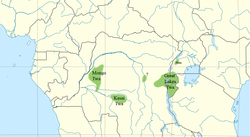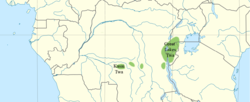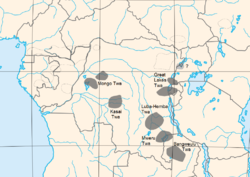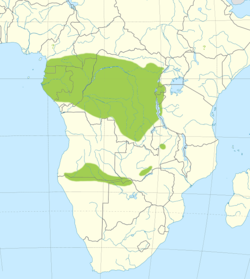- Twa
-
For the Twa people of the Great Lakes region, see Great Lakes Twa. For TWA as an acronym, see TWA (disambiguation).
Twa, Cwa[1] 
Twa populations according to Hewlett & Fancher. From west to east: Ntomba, Kasai, [unidentified], Great Lakes, Nsua [not clear if Nsua is Twa].

Twa populations according to Stokes. Only 2 groups are shown, but these include several between the Kasai and Great Lakes Twa.

Twa/pygmoid populations according to Cavalli-Sforza. Several southern groups are added.

Twa populations scattered through shaded area, according to Blench. Several southern Twa areas are shown.Total population ? Languages Related ethnic groups Twa person Mutwa people Batwa language country Butwa The Twa are any of several hunting peoples of Africa who live interdependently with agricultural Bantu populations, and generally hold a socially subordinate position: They provide the farming population with game in exchange for agricultural products.
The Bantu term Twa (see) is generally translated as "Pygmy". However, in the Western conception "Pygmies" are short forest people, whereas southern Twa populations do not live in the forest and may not be shorter than the farming/village population, generally not reaching the anthropological definition of "Pygmy" as males averaging less than 150 cm. Rather, agricultural Bantu peoples have settled a number of ecotones (the margins between ecosystems) next to an area that has game but will not support agriculture, such as the edges of the rainforest, open swamp, and desert, and the Twa spend part of the year in the otherwise uninhabited region hunting game, being provided with agricultural food while they do so. Outside of the rainforest, the Twa may be taller than the classic Pygmy, and there may be less difference in physical appearance—in some cases none. Nonetheless, the 'despised' relationship between the farmer patron and the hunter client is similar to that of the forest. No Pygmy population is known to live independently.
Roger Blench has proposed that Twa (Pygmies) originated as a caste like they are today, much like the Numu blacksmith castes of West Africa, economically specialized groups which became endogamous and consequently developed into separate ethnic groups, sometimes, as with the Ligbi, with their own languages. A mismatch in language between patron and client could later occur from population displacements. The short stature of the "forest people" could have developed in the few millennia since the Bantu expansion, as also happened with Bantu domestic animals in the rainforest, especially if there was additional selective pressure from farmers taking the tallest women back to the village as wives, as happens today. However, that is incidental to the social identity of the Pygmy/Twa.[2]
It is often supposed that the Pygmies were the aboriginal inhabitants of the forest before the advent of agriculture. However, Vansina argues that the original meaning of the (Proto-Bantu) word *Twa was hunter-gatherer ("bushpeople"), and that this became conflated with another root for Twa/Pygmy, *Yaka (as in Ba-Yaka).[3] As the Twa caste developed into full-time hunter-gatherers, the words were conflated, and the ritual role of the absorbed aboriginal peoples[4] was transferred to the Twa.[2]
Contents
Congo
Main articles: Great Lakes Twa and Mongo TwaTwa live scattered throughout the Congo. In addition to the Great Lakes Twa of the dense forests under the Ruwenzoris, there are notable populations in the swamp forest around Lake Tumba in the west (about 14,000, more than the Great Lakes Twa in all countries), in the forest–savanna swamps of Kasai in the south-center, and in the savanna swamps scattered throughout Katanga in the south-east, as in the Upemba Depression[citation needed] with its floating islands, and around Kiambi on the Luvua River.
Arab and colonial accounts speak of Twa on either side of the Lomami River southwest of Kisangani, and on the Tshuapa River and its tributary the "Bussera".[clarification needed]
Among the Mongo, on the rare occasions of caste mixing, the child is raised as Twa. If this is a common pattern with Twa groups, it may explain why the Twa are less physically distinct from their patrons than the Mbenga and Mbuti, where village men take Pygmy women out of the forest as wives.[5]
The Congolese variant of the name, at least in Mongo, Kasai, and Katanga, is Cwa.
Angola and Namibia
Southern Angola through central Namibia had Twa populations when Europeans first arrived in the 16th century. Estermann writes,
The southern Twa today live in close economic symbiosis with the tribes among which they are scattered—Ngambwe, Havakona, Zimba and Himba. None of the individuals I have observed differs physically from the neighboring Bantu.[6]These peoples live in desert environments. Accounts are limited and tend to confuse the Twa with the San.[2]
Zambia and Botswana
Main articles: Kafwe Twa and Lukanga TwaThe Twa of these countries live is swampy areas, such as the Twa fishermen of the Bangweulu Swamps, Lukanga Swamp, and Kafue Flats of Zambia; only the Twa fish in Southern Province, where the swampy terrain means that large-scale crops cannot be planted near the best fishing grounds.[7]
Cavalli-Sforza also shows Twa near Lake Mweru on the Zambia–Congo border. There are two obvious possibilities: the Luapula Swamps, and the swamps of Lake Mweru Wantipa. The latter is Taabwa territory, and the Twa are reported to live among the Taabwa.[8] The former is reported to be the territory of Bemba-speaking Twa.[9]
South Africa
In South Africa the term Twa is applied to the Bushmen, the former hunter-gatherers of the region.
References
- ^ A local variant of Twa in Congo. Pronounced [tʃwa].
- ^ a b c Blench, Roger. 1999. "Are the African Pygmies an Ethnographic Fiction?". Pp 41–60 in Biesbrouck, Elders, & Rossel (eds.) Challenging Elusiveness: Central African Hunter-Gatherers in a Multidisciplinary Perspective. Leiden.[1]
- ^ Vansina, Jan. 1990. Paths in the Rainforests: Toward a history of political tradition in equatorial Africa.
- ^ Scattered small hunter-gatherer populations survive in out-of-the-way places, some, such as the Hadza, with their original languages intact.
- ^ Jean Hiernaux, 1977. "Adaptation of the African to the rain forest", in Harrison (ed.) Population Structure and Human Variation
- ^ Estermann, Carlos. 1976. [Gibson, ed. and trans.] The ethnography of southwestern Angola, vol. I. Africana Publishing Company.
- ^ Lehmann, D. 1977. "The Twa: People of the Kafue Flats". In Williams & Howard (eds.) Development and Ecology in the Lower Kafue Basin in the Nineteen Seventies, 41–46. University of Zambia.
- ^ Ntole Kazadi, 1981. "Méprisés et admirés: l'ambivalence des relations entre le Bacwa (Pygmées) et les Bahemba (Bantu)." Africa 51-4.
- ^ John Desmond Clark. 1970. The stone age cultures of Northern Rhodesia
See also
Categories:- African Pygmies
- Ethnic groups in the Democratic Republic of the Congo
- Ethnic groups in Zambia
- Ethnic groups in Botswana
- Ethnic groups in Namibia
- Ethnic groups in Angola
Wikimedia Foundation. 2010.
